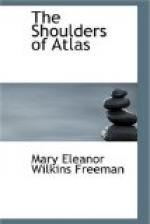“You won’t try to pass by any steam-rollers, and you’ll look out for automobiles, won’t you?” said Sylvia.
Horace left them talking and set out hurriedly. When he reached the Ayres house he entered the gate, passed between the flowering shrubs which bordered the gravel walk, and rang the bell with vigor. He was desperate. Lucy herself opened the door. When she saw Horace she turned red, then white. She was dressed neatly in a little blue cotton wrapper, and her pretty hair was arranged as usual, with the exception of one tiny curl-paper on her forehead. Lucy’s hand went nervously to this curl-paper.
“Oh, good-morning!” she said, breathlessly, as if she had been running.
Horace returned her greeting gravely. “Can I see you a few moments, Miss Lucy?” he said.
A wild light came into the girl’s eyes. Her cheeks flushed again. Again she spoke in her nervous, panting voice, and asked him in. She led the way into the parlor and excused herself flutteringly. She was back in a few moments. Instead of the curl-paper there was a little, soft, dark, curly lock on her forehead. She had also fastened the neck of her wrapper with a gold brooch. The wrapper sloped well from her shoulders and displayed a lovely V of white neck. She sat down opposite Horace, and the simple garment adjusted itself to her slim figure, revealing its tender outlines.
Lucy looked at Horace, and her expression was tragic, foolish, and of almost revolting wistfulness. She was youth and womanhood in its most helpless and pathetic revelation. Poor Lucy could not help herself. She was a thing always devoured and never consumed by a flame of nature, because of the lack of food to satisfy an inborn hunger.
Horace felt all this perfectly in an analytical way. He sympathized in an analytical way, but in other respects he felt that curious resentment and outrage of which a man is capable and which is fiercer than outraged maidenliness. For a man to be beloved when his own heart does not respond is not pleasant. He cannot defend himself, nor even recognize facts, without being lowered in his own self-esteem. Horace had done, as far as he could judge, absolutely nothing whatever to cause this state of mind in Lucy. He was self-exonerated as to that, but the miserable reason for it all, in his mere existence as a male of his species, filled him with shame for himself and her, and also with anger.
He strove to hold to pity, but anger got the better of him. Anger and shame coupled together make a balking team. Now the man was really at a loss what to say. Lucy sat before him with her expression of pitiable self-revelation, and waited, and Horace sat speechless. Now he was there, he wondered what he had been such an ass as to come for. He wondered what he had ever thought he could say, would say. Then Rose’s face shone out before his eyes, and his impulse of protection made him firm. He spoke abruptly. “Miss Lucy—”




